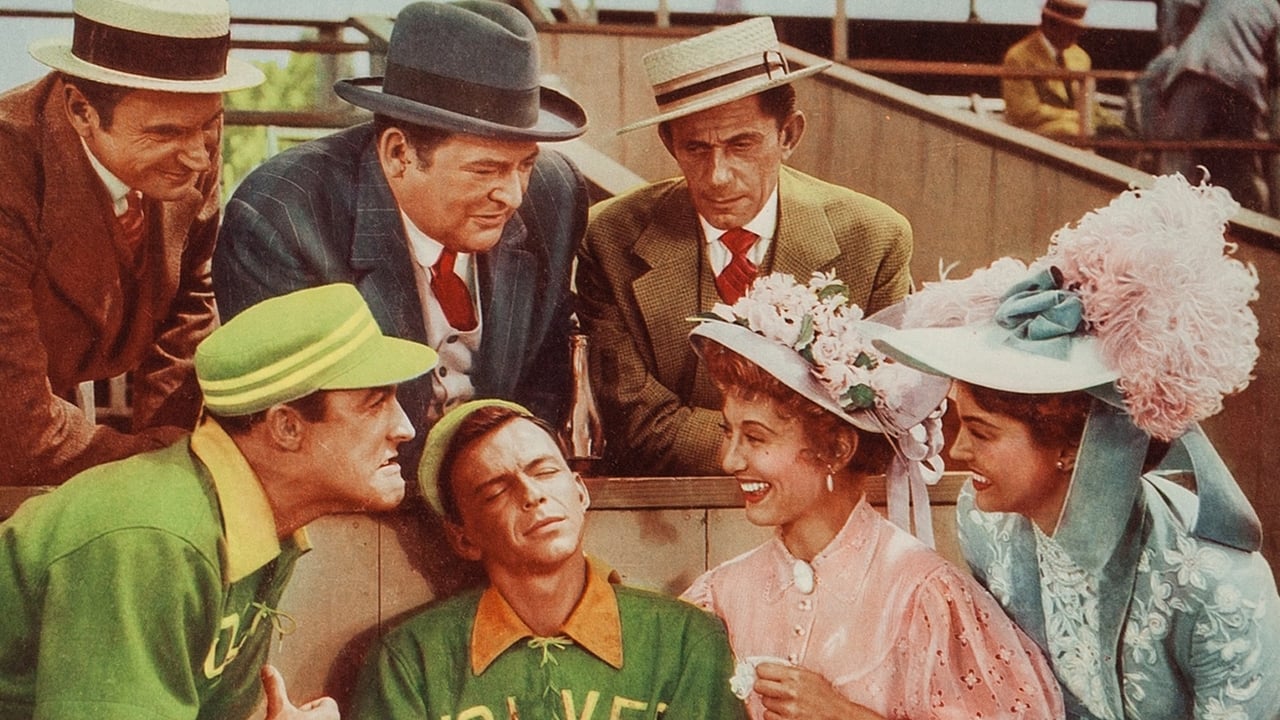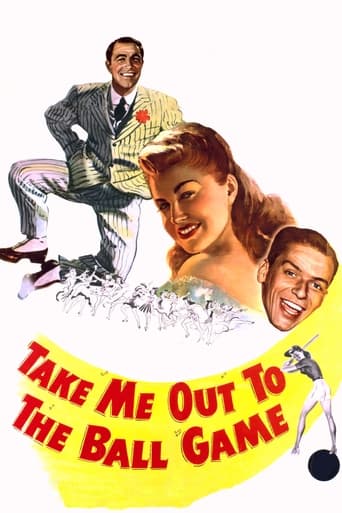EssenceStory
Well Deserved Praise
Teddie Blake
The movie turns out to be a little better than the average. Starting from a romantic formula often seen in the cinema, it ends in the most predictable (and somewhat bland) way.
Rio Hayward
All of these films share one commonality, that being a kind of emotional center that humanizes a cast of monsters.
Beulah Bram
A film of deceptively outspoken contemporary relevance, this is cinema at its most alert, alarming and alive.
gavin6942
The Wolves baseball team gets steamed when they find they have been inherited by one K.C. Higgins, a suspected "fathead" who intends to take an active interest in running the team. But K.C. turns outs to be a beautiful woman who really knows her baseball.There were many MGM musicals, and there were a few pairings of Frank Sinatra and Gene Kelly. Allegedly, Sinatra at this time had bad box office success, except when paired with Kelly. I can see why. Kelly is really the stronger of the two in this film, and Sinatra would not come into his own until his later tough guy movies in the 50s and 60s.This should not be seen as a classic, but it was a good showpiece for Esther Williams, who seems to be largely forgotten these days (2015). Who even remembers her as a swimming mermaid?
richard-1787
You might imagine, looking at the title of this movie, that it has something to do with baseball. You would be wrong. It's yet another Hollywood musical about vaudeville performers. Once in a blue moon two of them step on a baseball diamond, but nothing ever comes of it.You might also, looking at the list of those involved in the creation of this movie - director Busby Berkeley, starring Gene Kelly, Frank Sinatra, Jules Munshin, with musical numbers staged by Stanley Donen - imagine that this would be a great musical. You would, again, be wrong, unfortunately. All those individuals were, at one time or another, involved in the creation of some of the greatest American movie musicals, but this certainly isn't one of them.In fact, alas, it's pretty much of a dud. There isn't a memorable musical number in it, the choreography is nothing special, and the plot is both obvious and uninteresting.I sat through the whole thing, hoping something would get better, but it never did.I suggest you don't bother.
Gord Jackson
When I was about ten years old, I had my tonsils and adenoids removed. In recovery back home, I well remember sitting up on our sofa with my my loving, supportive parents offering encouragement to me that "Yes Gordon, you will get your voice back, no Gordon your throat will not always be sore." I equally well remember my father excitedly promising me that if I was good and did everything I was supposed to do and got well, we would all go (me, my parents and my brother) to see TAKE ME OUT TO THE BALL GAME when it opened next week at a local neighbourhood theatre for a Thursday-Saturday run . I was madly in love with the movies then (as I still am) and you bet, I wanted to see that picture. My father, bless his heart loved most sports and he took my brother and me to see almost everything he went to - football, baseball, hockey, wrestling, lacrosse, etc. Not surprisingly he also loved sports movies so tantalizing me with the prospect of seeing TMOTTBG was a slam dunk. (Trust me, my recovery trajectory had only one way to go.) Last week, when I saw the film available on DVD through our local public library I got to thinking about those events, so much so that I decided I would pick it up for a re-see, the nostalgia associated with the title proving too hard to ignore. More an occasional base hit than a grand slam home-run, the picture is the sort of pleasant, breezy musical-comedy entertainment as only MGM could produce them. Starring Frank Sinatra, Esther Williams, Gene Kelly, Jules Munshin and Betty Garrett, it's based upon a Kelly idea/homage to the early days of America's national sport, not that the plot means anything. It's well acted, comical, corny and interspersed with enough musical numbers to retain one's attention. What it does not have for me is very little that is memorable about those musical numbers. Betty Garrett's energetic "It's Fate, Baby, It's Fate" has its moments but only "O'Brian To Ryan To Goldberg" really registers thanks more to Jules Munshin than either Kelly or Sinatra.I am sure as a ten year old kid sitting in our favourite row in the Strand Theatre I would have loved TMOTTBG. As an adult re-viewing it sixty plus years later, not so much.
weezeralfalfa
The second of 3 Kelly-Sinatra comedic musical romances, being released only months before their more highly acclaimed "On the Town". Kelly was coming off two swashbuckler roles in the previous year: the highly accaimed historical drama "The Three Musketeers", and the innovative, but poorly received, Minnelli musical "The Pirate".Sinatra had most recently starred in the much criticized musical "The Kissing Bandit"(which neither he nor Kathryn Grayson wanted to do).Thus, it was decided that Sinatra apparently needed to be reteamed with Kelly to make a blockbuster film. They hit a home run twice in one year, with different leading ladies for the aggressive Kelly, but the same man-hungry lady(Betty Garrett) immediately falling for the skinny shy Sinatra character. It was Kelly who conceived the idea of combining vaudeville with baseball. Thus, Kelly and Sinatra are an unlikely pair of vaudeville performers in the off-season, and key players on the hottest team in the American League. Even more unlikely, their new owner is a beautiful single classy woman(Esther Williams, as K.C. Higgins), who insists she knows more about how to play the game than the players. Naturally, there is a clash with the braggart Kelly: the offensive and defensive star of the team, leading to some comedic moments.I have not read it as fact, but I strongly suspect that the name Higgins is derived from M.J. Huggins, who managed the NY Yankees during the Babe Ruth years of the 1920s. Sinatra(as Ryan) and Kelly(as O'Brien) vie for the heart of Miss Higgins, Shy, seemingly a bit retarded, Ryan has the initial lead but, as always, the more experienced extrovert Kelly character ultimately triumphs. Ryan gets the man-hungry baseball enthusiast Shirley(Betty Garrett) as a consolation prize. Betty had established vaudevillian talents, which film writers Kelly and Stanley Donen apparently thought were deficient in Esther. Hence, the much discussed unhappiness of Esther during much of the making of this film. Obviously, Kelly and Donen would have much preferred Judy Garland, the original choice as Higgins, or some other established top female known as a singer or dancer. Esther was most famously billed as a stunt swimming beauty, but she showed she could sing and do the comedy and dancing bits well enough. I'm not sorry she got the part. The ego-sensitive Kelly was also put off by the fact that Esther was a bit taller than him, which he thought looked bad when they were standing close.The drama of the last portion of the film centers around O'Brien's decision to moonlight as a show performer shortly before the end of the baseball season, baited by bookies who have bet his team won't win the pennant. His performance on the field greatly suffers and he is fired for violating curfew. A hesitant offer to rejoin the team for the last game has dangerous consequences for O'Brien, which precipitates the resulting drama. The closing scene has Kelly and Sinatra back on a vaudeville stage, now accompanied by Esther and Betty, and instead of singing the title song again, they do a reprise of the patriotic song "Strictly USA". Although not quite the flag waver of "Yankee Doodle Dandy" and some of the other musicals made during WWII, this film has its pro-America moments.I found all 5 of the vaudevillian song and dance routines entertaining, including Kelly's famous solo "The Hat My Dear Old Father Wore Upon St. Patrick's Day", part of which reminded me of Cagney's classic "Yankee Doodle Dandy". Vaudevillain Jules Munshin, who played the third leg of the double play trio, added an additional comedic element and would find an expanded role in "On the Town". The long chorus-accompanied "Strictly USA", at the claim bake, was also good, and served as a build up to Kelly's solo dance. Of the musical numbers, only two are romantically centered, one("The Right Girl for Me") sung, ironically, by Sinatra to Esther, the other("It's Fate, Baby, It's Fate") sung primarily by Betty to Sinatra. They are both good songs, but we are missing romantic ballads sung by Kelly to or with Esther, and sung by Sinatra to Betty. These would have provided additional breaks from the drama-comedy scenes and helped cement these relationships. Actually, such were filmed, but cut: a big mistake to my mind! They can be seen as outtakes on the 2008 Warner DVD. My rating of the film would go up a notch to nearly the equal of "On the Town", if these has been included. Cut was the catchy Harry Warner-Johnny Mercer "Baby Doll", sung by Kelly, with some comedic gesturing by Esther and prancing by Kelly. Later, Astaire would sing it to Vera-Ellen, followed by their dance, in "The Belle of New York".In summary, I found this a top notch entertaining musical, nearly the equal of "On the Town", with multiple good vaudevillian song and dance routines and lots of comedy, but missing two of the best filmed songs. I only wish they didn't always make Sinatra seem so dopy and naive compared to Kelly(no doubt a Kelly-directed characterization). It gets better each time I view it:the mark of a true classic. Rating 9.5

